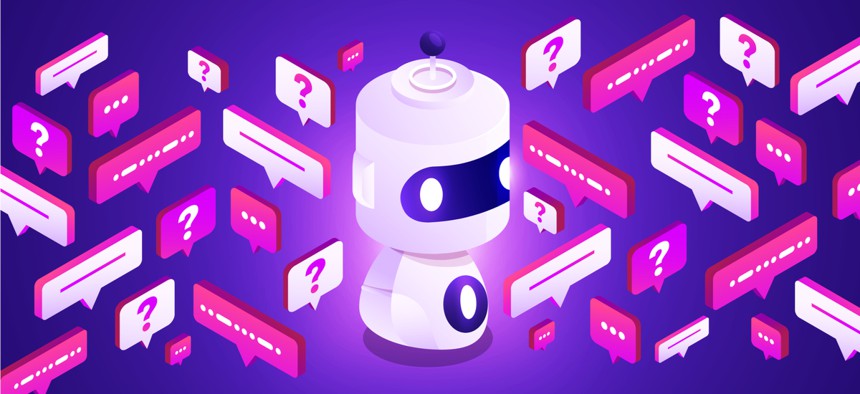Government Striving for New Ways of Working

emojoez/Shutterstock.com
Ensuring necessary and equitable access to services will likely mean a hybrid approach of both digital and physical access for citizens.
Public sector organizations pivoted to new ways of working in the early weeks of the COVID-19 crisis, striving for speed, continuity and responsiveness around their mission priorities and vital services.
Today, with the ongoing threat of the virus and vast economic and operational impacts, government agencies should look to permanently transform their post-COVID workforces and ways of working, while recognizing that not all staff can perform remotely and not all services can be delivered virtually.
Ensuring necessary and equitable access to services will likely mean a hybrid approach of both digital and physical access for citizens. Such workforce and service transformation also requires a smart investments in new technology.
Build Digital ‘Contact-Light’ Services
Since the crisis began, agencies have stood up new digital services, such as virtual agents, to provide wide-ranging assistance while minimizing risk. Smarter services will drive the next evolution. To do this, agencies must use predictive analytics to complete transactional citizen services—everything from driving license renewal requirements to in-person appointment scheduling where needed. By transparently using data from digital interactions via machine learning algorithms, agencies can change their service delivery models to predict and support customers’ current and future needs.
Citizens have tasted what’s possible with these digital interactions at speed during the pandemic and will expect more moving forward. To achieve this, agencies must enhance their skills to support new digital service delivery models, ensuring employees are capable of and supportive of working alongside new artificial intelligence resources and cultivate a culture of collaboration and co-operation both internally and across agencies.
Empower a Distributed Workforce
Agencies had to quickly create remote working infrastructure in response to the pandemic, though processes are still not fully digitized and not all employees have the tools to work effectively from home. Some workers have been insufficiently trained on how to use remote collaboration tools and manage their workloads from home. Government agencies must now take steps to perfect their new workforce structures and put in place the right people, processes and technologies to facilitate a greater shift to remote working, requiring for some employees only occasional visits to the office.
The pandemic has amplified the importance of employee welfare, wellbeing and safe working practices. Employees whose well-being is prioritized by employers and equipped with the digital tools they need to undertake and collaborate in their roles will stay engaged, remain productive and retain trust in leadership.
Unleash Human + Machine Collaboration
Human and machine collaboration is not new to public service. Before the pandemic, an Accenture survey found that more than three-fourths (76%) of public service leaders felt it critical to drive innovation within their organizations including the use of new AI technologies. The pandemic has accelerated the adoption of AI and new machine learning technologies capable of providing customer services and enhancing process automation.
Leaders must continue to identify which tasks require human judgment and cannot be undertaken by machines and to enable interactions where human workers can train AI to be more accurate and perform better. Beyond automation, employers must consider how to best apply new technologies to improve the experience of work. For example, extended reality could be used for immersive training, machine learning for knowledge management and AI for career mapping. Through it all, prioritize trust and transparency—with employees and citizens—so they are not threatened and understand the benefits.
For leadership, the drive to create efficiencies and improve citizen service experiences through the use of AI and machine learning will continue post-pandemic. Agencies must continue to prioritize trust and transparency—not just with employees but between citizens and government—so no-one feels threatened by new technologies. Rather, they should be excited about the benefits.
Become an Ecosystem Orchestrator
Citizens expect seamless services from government agencies and the private sector. Meeting these expectations will only be possible through ecosystem collaboration, including cross-agency data sharing and close co-operation with private sector partners. By integrating and interpreting data from multiple government agencies and the private sector, agencies can deliver better integrated, smart and customer-centric public service. New data-exchange platforms can enhance ways of working and improve internal and cross-departmental collaboration, building in new flexibilities and processes.
Enhanced data management, combined with the power of AI and machine learning, will also ensure agencies better understand and predict citizen needs, especially for complex services like health, social and benefit needs. By working with a wide and diverse ecosystem of partners, government agencies can develop personalized outreach and support programs for citizens based on their unique circumstances.
Being Ready for the Never Normal
By further evolving the workforce changes made from necessity during the pandemic, government agencies can drive a fundamental transformation of how public services are delivered tomorrow and into the future. Providing lasting benefits to citizens and society is not a one-time exercise and must constantly evolve to respond to the changing needs of service users.
By committing to a virtuous circle of discovery, blueprinting and transformation—and being prepared to make refinements in-step with changing needs at speed—government agencies can elevate their workforce’s day-to-day experiences and those of the citizens they serve. Today’s world requires us all to be agile, adaptive and resilient for what lies ahead.
Ryan Oakes is senior managing director of Accenture Public Service.





